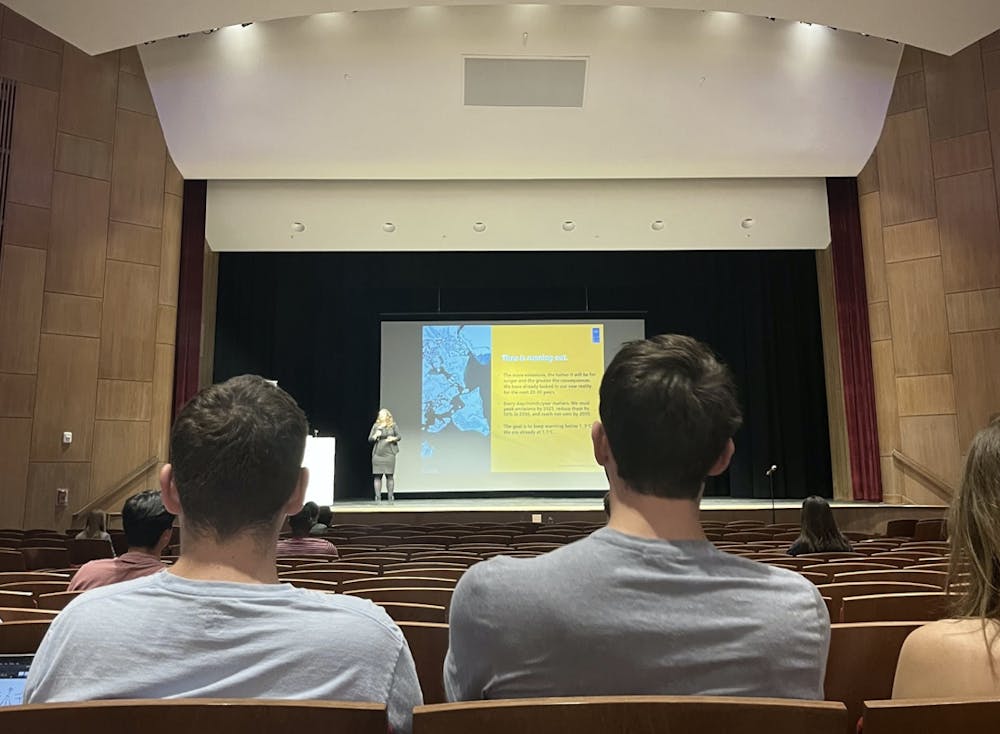The Foreign Affairs Symposium (FAS) hosted Cassie Flynn on April 13 to discuss the difficulties involved in combatting climate change. The event was the penultimate installment of the “Shattered Reality: Reimagining the Future” speaker series.
Flynn currently serves as a strategic advisor on climate change to the United Nations Development Programme, where she also leads the organization’s Climate Promise initiative. She previously helped facilitate negotiations of the Paris Agreement.
In an email to The News-Letter, FAS Co-Executive Director Maiss Mohammed explained why the organization invited Flynn.
“As we reimagine the future, developing and implementing innovative solutions to climate change must be prioritized,” she wrote. “I hope that our attendees left with a better understanding of the current global climate change crisis and were inspired to take small actions to mitigate the effects of it.”
Flynn introduced the science of climate change before tracing the disconnect between the scientific community’s outlook on this topic and the world’s response to it. She explained that, as information passes from scientists to governments, the conversation shifts from an examination of data into a negotiation on how the climate crisis will be dealt with politically.
She emphasized that climate change impacts everyone, though in a fundamentally unequal manner.
“There’s no safe zone here; the climate crisis reaches everywhere. Yet climate change is also a threat multiplier; it feeds into and intensifies all of these big challenges in the world,” she said. “So depending on your income, on where you live or whether you’re older, the climate crisis is going to affect you differently, and your ability to cope with those impacts is also very different.”
Flynn explained that inequity is not only affected by climate change but also causes it. According to her, the European Union and nine other countries, including the U.S. and China, are responsible for over two-thirds of global greenhouse gas emissions. On the other hand, the 100 lowest-emitting countries make up less than 4% of emissions.
Freshman Alexandra Gorham expressed her appreciation for Flynn’s framing of the crisis and its solutions in an email to The News-Letter.
“I liked how she incorporated the personal dimension of climate change into the discussion because I feel like most people tend to focus only on how it stresses global systems,” she wrote. “At the same time though, when urging us to take action, she also acknowledged the disproportionate harm a small group of entities do to it, which was very practical.”
Flynn also touched on some of the problems that make it difficult to create solutions to climate change. As an example, she highlighted the ongoing energy crisis as a result of the Russian Federation’s invasion of Ukraine.
“We made commitments as part of the Paris Agreement to replace fossil fuels with renewable energy,” she said. “When the going gets tough, all of the sudden we’re releasing millions of barrels of oil. You have a lot of developing countries looking at rich ones and saying, ‘Hey, you got rich through fossil fuels; how are you going to look at us alone to make the sacrifices?’”
While she acknowledged such backsteps and inequities can be discouraging, Flynn stressed the importance of learning from these instances to better inform the ongoing fight for climate justice.
“For a long time, we talked about the word ‘transformation,’” she said. “As we’ve gone further down the path, a lot of us have realized it's actually about managing transitions. How do you get from the immediate constraints of needing to power entire economies to a longer-term plan that is net-zero? And how do you shorten that transition, so you don’t lock in a future that’s dirty?”
Flynn directly appealed to the audience to participate in the ongoing fight.
“You are going to be facing challenges throughout your lifetime because of choices that were made long before you were here,” she said. “It's an uncomfortable reality, and it's a difficult reality — but that doesn’t mean that amidst these rising seas and rising temperatures that we can’t rise up ourselves. My request to you today is to never ever stand on the sidelines in this crisis.”
She highlighted that the window for action is short, but there is still time to make a difference.
Gerardo Fontes, member of the FAS programming committee, praised this outlook in an email to The News-Letter.
“Because she’s one of the people working internationally to deal with climate change, it felt like she was a real voice in the discussions, as compared to the typical people we hear online talking about climate change,” he wrote. “She gave me a bit more hope for the future in showing that we really have made progress with regards to climate change, since most media outlets focus so much on the negative.”





